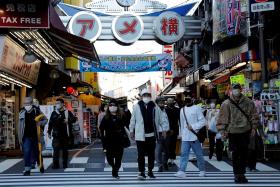Taiwan leader accuses China of hindering Pfizer vaccine deal
TAIPEI Taiwan yesterday accused China of hindering its efforts to obtain Pfizer-BioNTech vaccines from Germany as it struggles with a sudden spike in coronavirus cases and a slow inoculation campaign.
Taiwan further tightened curbs yesterday to control Covid-19 cases, including banning in-restaurant dining, fines for people not wearing face masks outside, and a halt to wedding banquets and wakes.
The country reported 633 cases and 11 deaths yesterday, taking total infections to 6,091 and the death toll to 46.
President Tsai Ing-wen yesterday explicitly accused China of being a stumbling block to getting Pfizer shots.
"We had almost completed the contract-signing with the German manufacturer at one point, but it has been delayed till now because China has interfered," Ms Tsai said .
DIFFICULTIES
Back in February, Taiwanese officials had hinted that China was causing difficulties, but officials steered clear of explicitly naming Beijing.
Dr Tsai's administration has not detailed why it believes China has been a stumbling block. Beijing, which regards Taiwan as its territory, has previously denied putting up roadblocks.
Pfizer-BioNTech's distributor for the Greater China region - which includes Taiwan - is Fosun Pharma based in Shanghai.
Taipei has insisted it wants to deal only with the German firm, something which Beijing would likely baulk at.
"Only by purchasing (the vaccines) from the original manufacturer can we obtain direct guarantee in quality and safety to avoid legal and political double risks," Dr Tsai said.
Chinese Foreign Ministry spokesman Zhao Lijian yesterday said "Taiwan's access to vaccines from the mainland is smooth", without elaborating further.
BioNTech's German office has said it still intends to provide Taiwan with vaccine doses and that discussions were ongoing. Fosun has also said it is willing to supply doses. But still no jabs have materialised.
Taiwan has millions of shots on order, from AstraZeneca and Moderna but has received just slightly more than 700,000 to date, and it has been able to vaccinate only about 1 per cent of its population. - AFP, REUTERS
Get The New Paper on your phone with the free TNP app. Download from the Apple App Store or Google Play Store now


